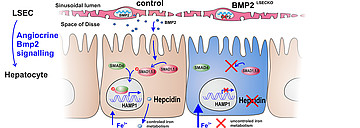Sie befinden sich hier
Inhalt
While the transcriptional programs regulating arterial, venous and lymphatic specification have been characterized in substantial molecular detail in recent years, a master regulatory transcription factor such as Prox-1 for lymphatic EC could not be identified for blood microvascular EC. Therefore, it came as a major breakthrough that the combination of the transcription factors etv2, erg, and fli was sufficient to induce full continuous blood vascular endothelial reprogramming in amnion cells. In contrast, the molecular regulators driving organ-specific differentiation of microvascular EC have not yet been comprehensively elucidated. This dictum also applies to hepatic angiodiversity. While Id1, liver X receptor (LXR)-α, endothelial Notch signaling, KLF2, and Erg have been shown to contribute to the molecular differentiation program of LSEC, a molecular master regulator for LSEC specification and differentiation has hitherto been elusive.
Gata4: a master regulator of angiocrine signaling in the liver. Fortunately, we have now been able to identify the transcription factor Gata4 as molecular master regulator for LSEC differentiation. Gata4 also controls down-stream angiocrine functions of LSEC on liver homeostasis and metabolic maturation mediated by Bmp2, Wnt, and Rspo3 signaling. Using newly generated LSEC-specific cre-driver lines (stab2-iCre), LSEC-restricted deletion of Gata4 was embryonic lethal and caused transformation of discontinuous liver sinusoids into continuous capillaries (sinusoidal capillarization). This switch from discontinuous LSEC to continuous EC also impaired immigration of hematopoietic progenitor cells into the liver resulting in lethal anemia. Preliminary results show that LSEC-specific Gata4 deficiency in adult mice causes hepatopathy and liver fibrosis also accompanied by sinusoidal capillarization.

Géraud C*, Koch PS*, Zierow J*, Klapproth K, Busch K, Olsavszky V, Leibing T, Demory A, Ulbrich F, Diett M, Singh S, Sticht C, Breitkopf-Heinlein K, Richter K, Karppinen SM, Pihlajaniemi T, Arnold B, Rodewald HR, Augustin H, Schledzewski K, Goerdt S (2017) Gata4-dependent organ-specific endothelial differentiation controls liver development and embryonic hematopopiesis. The Journal of Clinical Investigation 127: 1099-1114.
Koch PS*, Olsavszky V*, Ulbrich F, Sticht C, Demory A, Leibing T, Henzler T, Meyer M, Zierow J, Schneider S, Breitkopf-Heinlein K, Gaitantzi H, Spencer-Dene B, Arnold B, Klapproth K, Schledzewski K, Goerdt S*, Géraud C* (2017) Angiocrine Bmp2 signaling in murine liver controls normal iron homeostasis. Blood 29: 415-9.
Olsavszky V, Ulbrich F, Singh S, Diett M, Sticht C, Schmid CD, Zierow J, Wohlfeil SA, Schledzewski K, Dooley S, Gaitantzi H, Breitkopf-Heinlein K, Géraud C, Goerdt S, Koch PS (2017) GATA4 and LMO3 balance angiocrine signaling and autocrine inflammatory activation by BMP2 in liver sinusoidal endothelial cells. Gene 27: 491-499.
Leibing T*, Géraud C*, Augustin I, Boutros M, Augustin HG, Okun JG, Langhans CD, Zierow J, Wohlfeil SA, Olsavszky V, Schledzewski K, Goerdt S, Koch PS (2018) Angiocrine Wnt signaling controls liver growth and metabolic maturation in mice. Hepatology doi: 10.1002/hep.29613. [Epub ahead of print]
Kontextspalte
Ärztliche Leitung

Prof. Dr. med. Sergij Goerdt
Direktor der Hautklinik
Facharzt für Haut- und Geschlechtskrankheiten
Allergologie
Dermatopathologie
Praktika & Abschlussarbeiten
Bei Interesse an der Mitarbeit an einem unserer Forschungsprojekte wenden Sie sich bitte an Prof. Dr. med. Sergij Goerdt oder Dr. med. Philipp Reiners-Koch. Es besteht die Möglichkeit der Absolvierung eines Laborpraktikums, der Anfertigung einer Diplom- bzw. Masterarbeit sowie die Durchführung einer medizinischen bzw. naturwissenschaftlichen Doktorarbeit.

